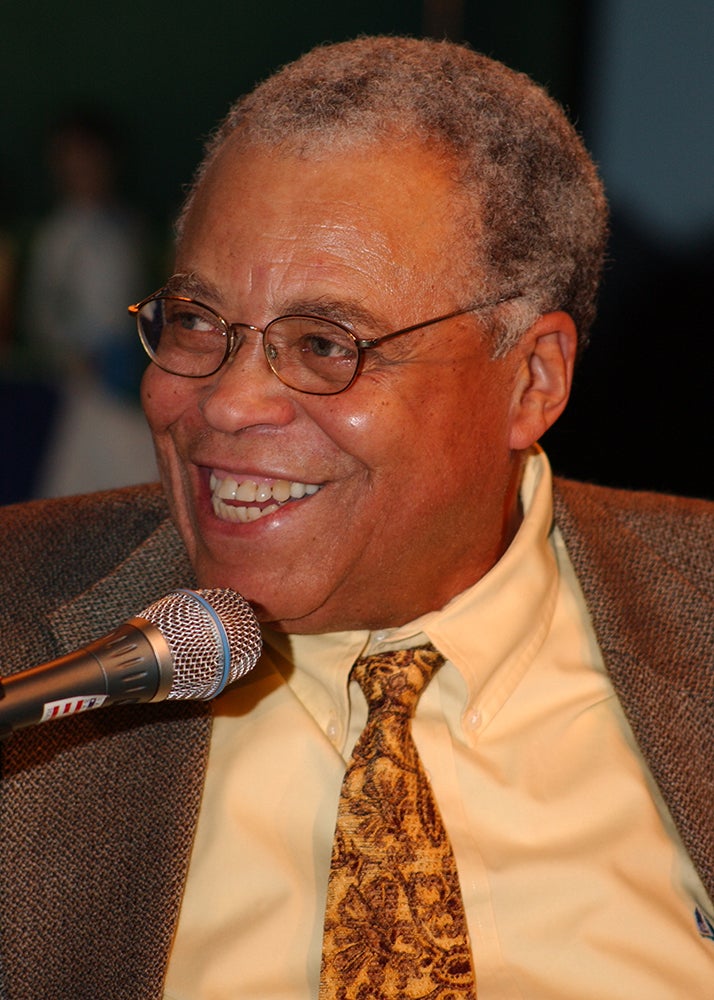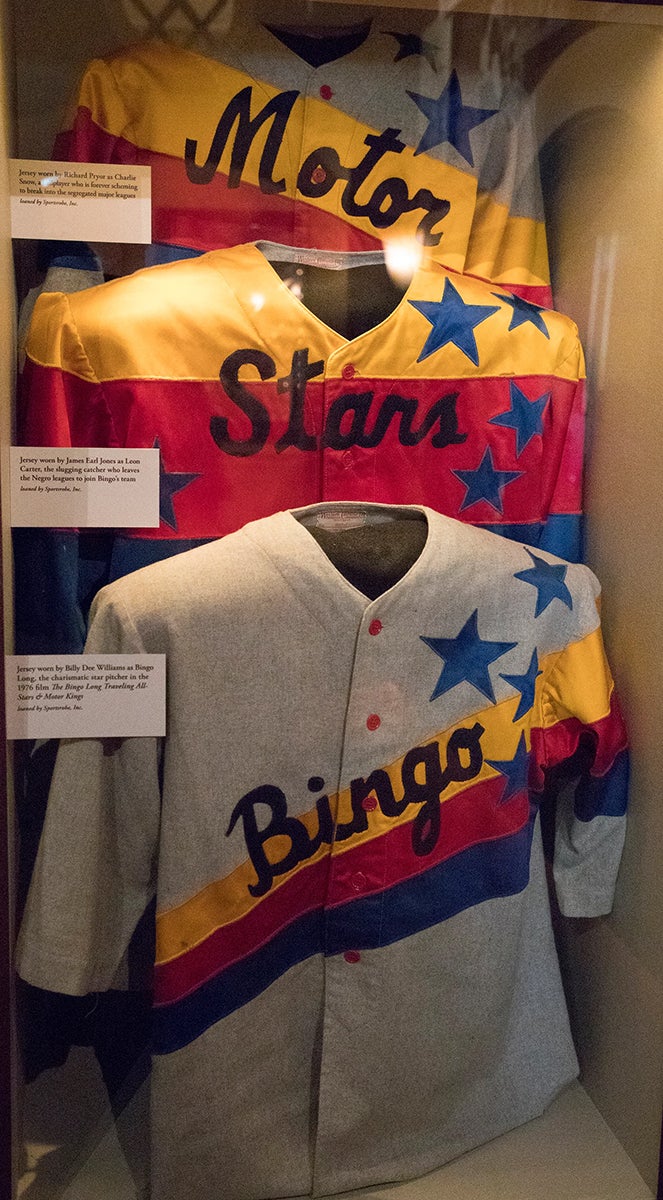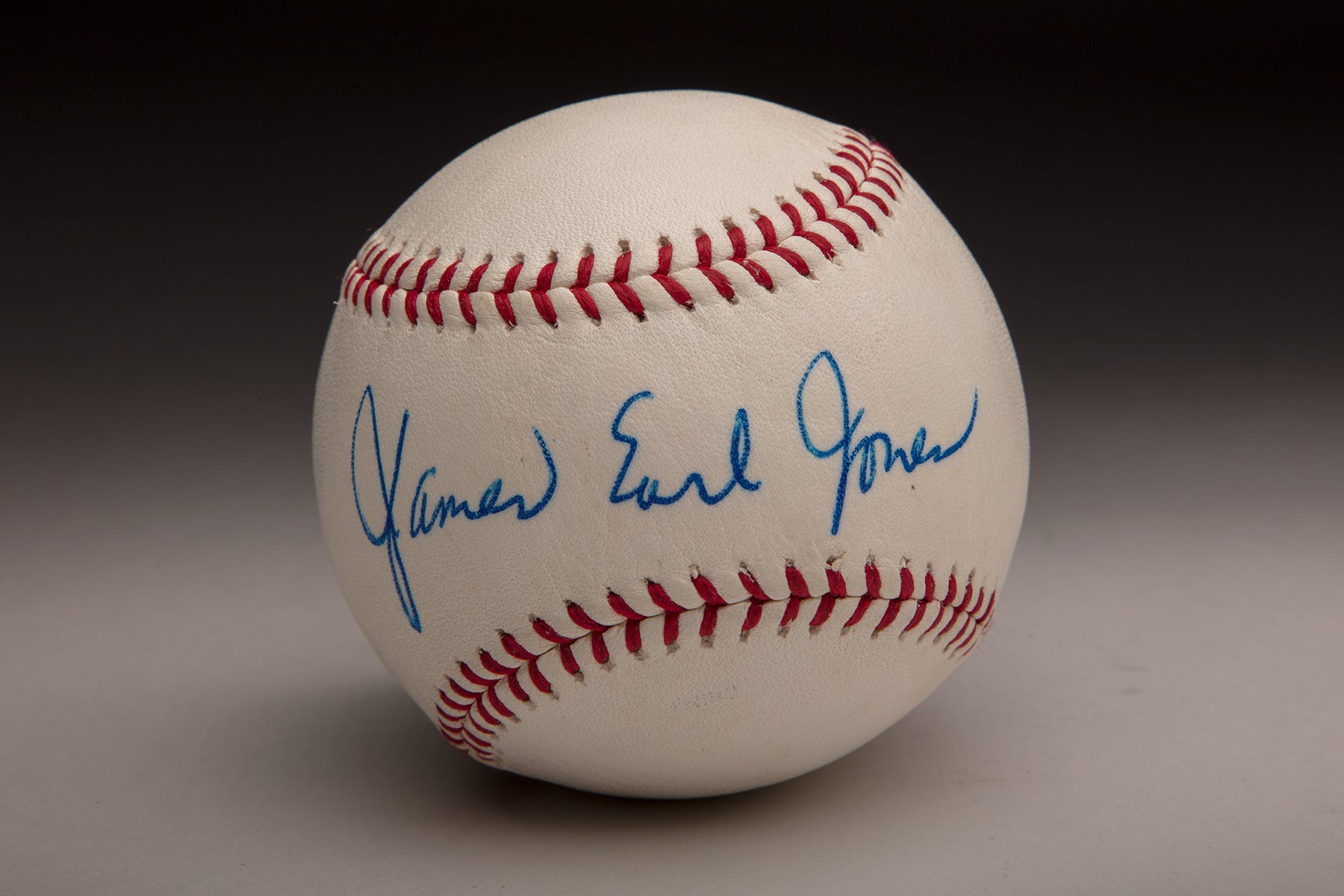Remembering James Earl Jones' Hall of Fame visit

“If you build it, James Earl Jones will come.”
An accomplished actor with one of the most recognizable voices in this country (see Darth Vader in Star Wars, Mufasa in The Lion King, his now-famous “This is CNN” on a certain cable news network, and numerous Verizon ads), James Earl Jones was the Museum's featured guest on April 17, 2004, as the institution hosted a 15th anniversary salute to the movie Field of Dreams. Other baseball films Jones has performed in include The Bingo Long Traveling All-Stars and Motor Kings (1976) and The Sandlot (1993).
For Jones, who passed away at the age of 93 on Sept. 9, 2024, a few of the roles in his long and illustrious acting career in which he was most honored have some sort of sports connection, whether it be his portrayal of boxer Jack Johnson on the stage (1969 Tony Award for Best Actor) and screen (1969 Oscar nomination for best actor) in The Great White Hope, or when he played a former baseball player in Fences (1987 Tony Award for Best Actor). Besides athletes, his acting resume included playing everyone from Othello to Paul Robeson to Lenny in Of Mice and Men.
While in Cooperstown, though, Jones was just himself. Responding to questions from a number of sources throughout his stay, he exhibited thoughtfulness, wit and an ability to occasionally hit one out of the park that his various audiences thoroughly enjoyed.
Do actors have to be good athletes to play athletes?
James Earl Jones: I really had to get in shape for boxing. Baseball it was more a matter of learning how to stand and to be somewhat convincing as a slugger up at the plate. I insisted on hitting the ball (in Bingo Long). I couldn’t, but I did have to consider what it was about.
Were you the first choice in Field of Dreams?
I think the author of the novel had J.D. Salinger in mind. J.D. Salinger told the film company, “You got away with it in the novel, but you’re not going to get away with it in the film. You use my name or a likeness of me in any way and I’ll sue you.” So the lawyers suggested going around the globe and get someone completely opposite from J.D. Salinger. Not a novelist but a journalist, not a white guy but a black guy, and that’s how I lucked out and got the role. I was second choice.
Are you a baseball fan?
Could I say that I wasn’t and be here. I was raised on a farm and my grandfather was a fan of Satchel Paige. He would listen to a lot of baseball. We didn’t have TV, of course. We never saw a baseball movie. We got baseball on radio. You had to have a good imagination and a lot of knowledge about baseball to really appreciate baseball on radio in those days, back in the 1930s.
You’ve played a lot of athletes over the years. Is that just luck?
No. I’ve also played a lot of admirals and generals, too, because I was 6 foot tall or more, 200 pounds or more. I look like I was once an athlete. And that qualifies you for all kinds of heroic roles like that.
You must have done a lot of training for The Great White Hope, right?
Yeah, I had to really work at that. I hated it. It was nice being in shape, but man, what a price. They trained me like a boxer, I ate like a boxer, I did morning work like a boxer, I did gymnasium work like a boxer, and I sucked a lot of lemons. I finally got into it. My father is former amateur prize fighter, heavyweight. Our bonding, his and my bonding, probably happened strongest there when he was able to talk to me about the aestheticism of a boxer’s training. Actors are not that well-trained or disciplined. I wish we were.

What were your thoughts when making The Bingo Long Traveling All-Stars and Motor Kings?
We made it a comedy. All the liberal critics and all the black critics said, “How dare you take that kind of money and that kind of platform and not tell of the tragedy of those players?” And indeed there was tragedy. But we chose to make it a comedy and suffered for it with the reviews and the reception it received. But it’s still a movie that people respect. I’m glad we did it as a comedy because I think sense of humor is a sign of intelligence.
What has been your favorite role?
I have no favorite role, but I have a favorite kind of movie and it just so happened that Field of Dreams fits in that category. It’s the small movies; most people have never seen them. I would list them as Cry, the Beloved Country, Claudine, The UFO Incident, Matewan, about the coalminers in West Virginia. They’re little simple stories simply told. They’re the movies that I cherish.
Were you an athlete while growing up?
In high school we had a graduating class of 17 kids, boys and girls. We couldn’t field a baseball team, and we barely had a basketball team. On the court, if I’m receiving the ball, I’d scream in pain as I caught it. I was a big sissy, and flatfooted. I was of no use to the school on the athletic field. No use at all. I ran track, by myself, a mile. That was it. I’m an interloper when it comes to playing these roles in sports movies. But I love it.
What are you thoughts on visiting the Hall of Fame today?
I just thought about how people dedicate themselves to a career, whether it’s fun or work.
You said in the past that “Baseball is Zen.” Explain?
I wouldn’t say baseball is mundane, but it’s ordinary by intention, unlike the sport of boxing, which is kind of gladiatorial, or football, which has its grace, ballet, and great brute force. I took my son, who is now 21, to his first baseball game in Anaheim. It was a summer day, of course, and what he liked about it was he could sit there and watch the airplanes and watch the birds and not miss a thing. That’s how in the groove of life it is.

Can you rank Field of Dreams as far as a movie and your personal enjoyment in making it?
I wouldn’t rank it as a baseball movie at all. It belongs here in Cooperstown. It’s about fathers and sons. When a child is born, especially a male child, mama is the primary companion and papa is secondary. But one day papa says, “Let’s go out in the backyard and play catch.” That’s the first bonding that many male children have with their fathers. And that’s what this movie is about, I think, that first bonding between father and son. Ray rejects it, saying, “Get out of here with that baseball catch in the backyard stuff.” He rejected his father and his love of baseball. Now he wants to recover it. And that’s why Doc Graham is there, that’s why Terence Mann is there, and why all these recycled spirits come to aid and recapture the moment that he could have played catch with his father.
Did you ever want to avoid the public eye like your character in Field of Dreams?
The week I got cast for this movie I saw a photograph of J.D. Salinger. Some photographer had caught him at a supermarket in New Hampshire, had intruded in his life, and took his picture. The rage on J.D. Salinger’s face was very informative. I tried to take that into the character. So when Kevin (Costner) comes in to kidnap me, I’m in the throes of that rage. I think I understand that. I have never been in a situation where I wanted to be left alone, but I understand it.
What inspired you to do Field of Dreams?
The script arrived at my house before I got home. My wife read it, and when I got home, she said, “Honey, you will do this script.” It’s not that I do everything my wife says. She said, “It’s a great script. The long speech about baseball will not appear in the movie, of course, but you must do it anyway.”
Bill Francis is the senior research and writing specialist at the National Baseball Hall of Fame and Museum
